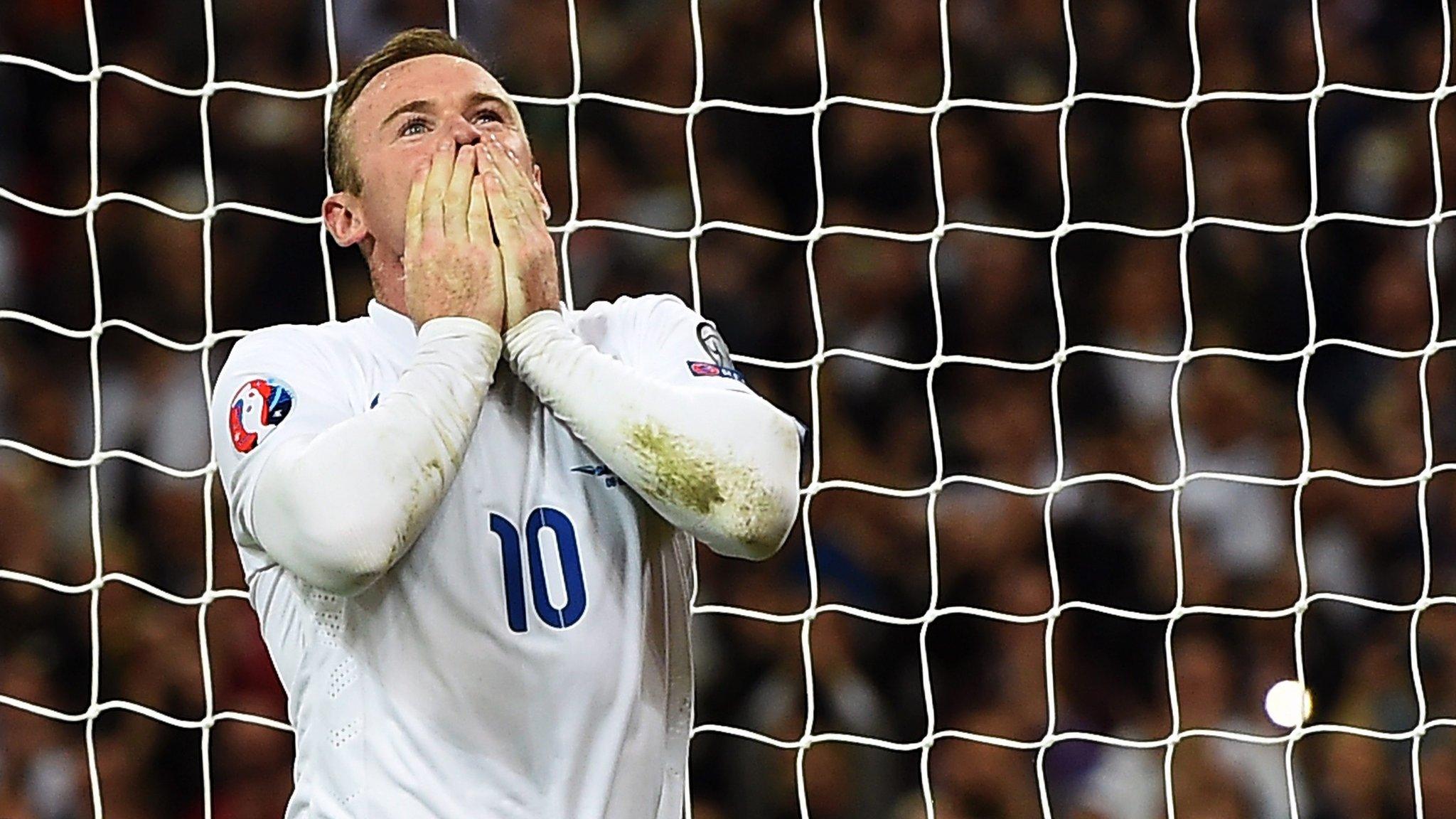George Camsell: The best England striker you never heard of
- Published
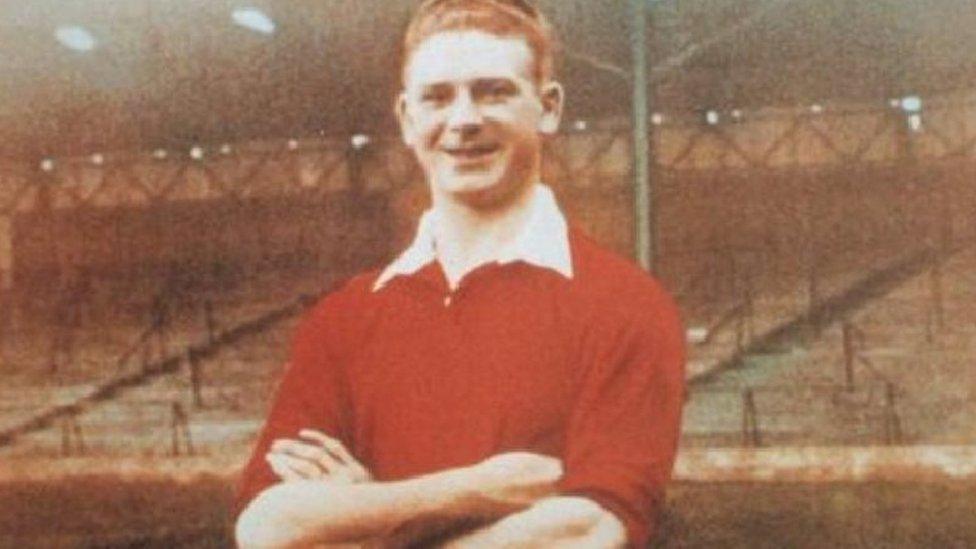
George Camsell has the best goal-scoring ratio for England
Who is England's best ever striker? It has been a question at the forefront of football conversations since Wayne Rooney became the national team's top goalscorer. But ask fans of a certain generation in Middlesbrough and there is only one answer.
George Camsell is probably the best England striker you have never heard of.
He averaged two goals a game for his country - a record ratio - and is Middlesbrough's all-time top scorer with 345 strikes in 453 appearances.
And, after hanging up his boots, the former miner discovered a young striker called Brian Clough.
So why, apart from among older fans, is he not talked about today as one of the greats?
Sadly for him and his legacy, Camsell had a knack of setting seemingly unbreakable records only to see them snatched away by the narrowest of margins. And, as Dr Alex Jackson from the National Football Museum says, people forget the second-placed.
His 59 league goals in an English season has only been beaten once and that was the very next year, by Everton's Dixie Dean, external.
Dean beat the record by one goal - and his record is regarded as one that will probably stand forever.
Camsell scored in nine consecutive games for England - and again only one person has bettered that.
Steve Bloomer scored in 10 games in a row for the Three Lions in the 1890s.
Camsell's career in numbers
18
Goals in nine games for England
-
345 Goals in 453 games for Middlesbrough, their all-time top goalscorer
-
59 Goals in 37 Boro games in 1926-27
-
24 Hat-tricks scored across his career
-
2 Goals a game averaged for England, still a record ratio today
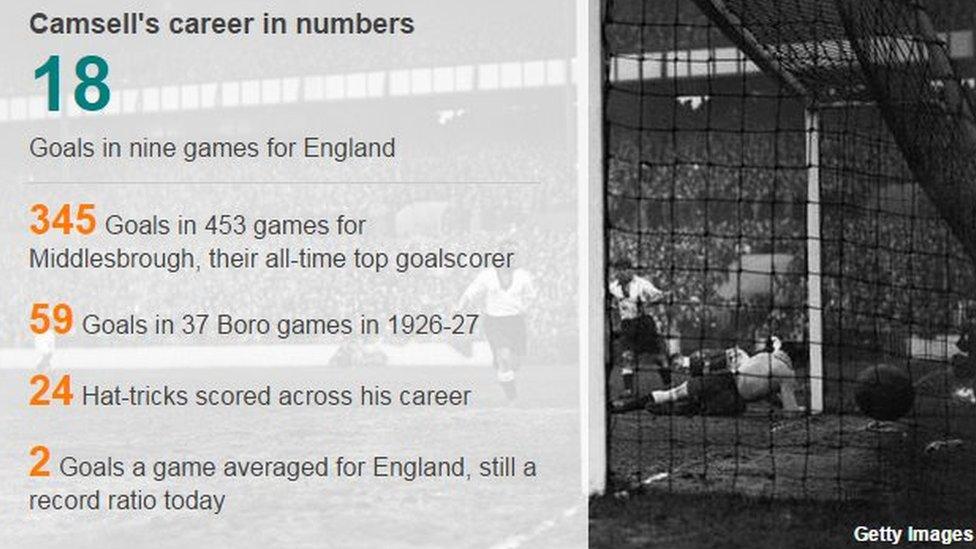
There are several other reasons why Camsell's feats might have been forgotten.
He was playing at a time when footballers generally did not attract the celebrity status that they do now. For a player in the 1920s to release an autobiography, for example, was unheard of.
And though his goalscoring prowess might have been phenomenal enough to nudge him into the public consciousness, he was overshadowed by the presence of Dixie Dean.
While Camsell was breaking records at Middlesbrough's Ayresome Park as Boro flitted between the top two divisions, Dean's mammoth goal hauls were helping Everton win titles and cups.

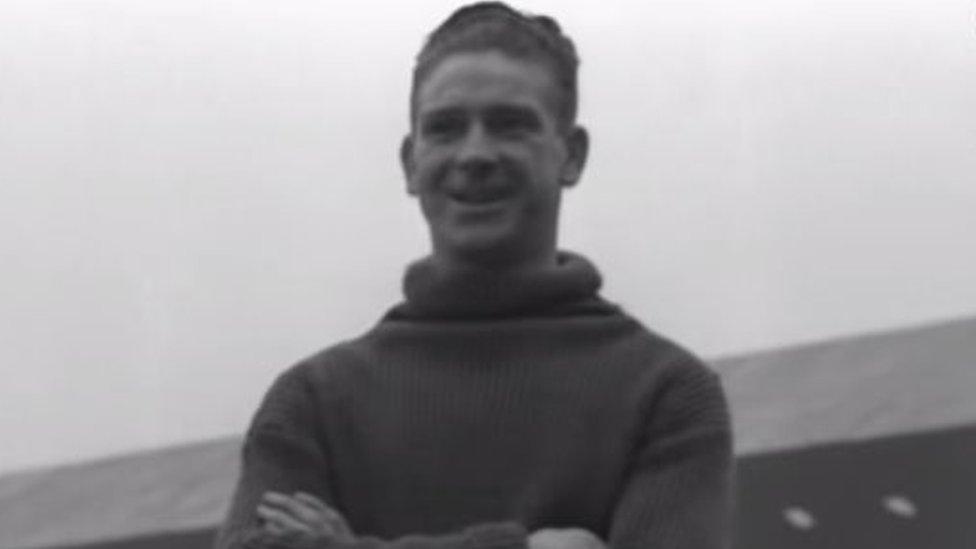
Who was George Camsell?
Camsell was born in 1902 in the Framwellgate Moor area of Durham.
He started work as a miner but came to the attention of Middlesbrough after scoring 20 goals in 21 appearances in a season for Durham City.
His first appearance for Middlesbrough was on 31 October 1925, against Nottingham Forest.
The following year he netted 59 times - including nine hat-tricks - in 37 league games, then a new record.
His last game was a 3-2 win over Leicester City on 10 April 1939, in which Camsell scored the opening goal.
Camsell spent the war years working for factories on Teesside before becoming first a scout, then a coach and finally the assistant secretary of Middlesbrough FC.
While a scout he discovered a young Brian Clough.
He retired in 1963 and died at the age of 64 in 1966 shortly before England won the World Cup.

The way England squads were selected also might have gone against him winning more caps and boosting his profile.
Players were chosen by a committee and Dr Jackson said being selected for the England team was a reward for a period of good play rather than simply being among the nation's best.
Therefore many more players were called up for one or two games but few got the high number of caps their talent deserved.
And in Camsell's era there were simply far fewer international games. In the season he made his debut, 1928-29, there were just six matches. Last season England played 10 times and the year before it was 14 - and would have been more but for an early departure from the World Cup.
But Camsell deserves to be remembered in the same way as Dean, Dr Jackson said.
"His record speaks for itself," he said.
"The problem he has is people still talk today of Dixie Dean because he holds the record for league goals scored in an English season, no-one ever talks about who finished second, no matter how remarkable that person is.
"Camsell is remembered as a local hero rather than a national one but he is certainly up there with the game's all-time greats."
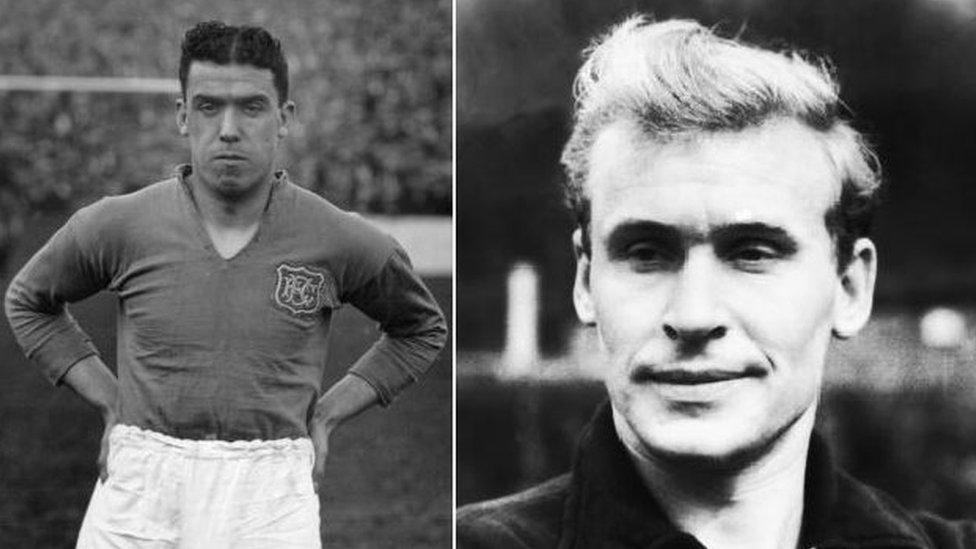
Dixie Dean scored a record 60 goals in an English season while Middlesbrough legend Wilf Mannion was a keen admirer of George Camsell
But would he want a fuss to be made?
"He was proud of what he achieved but he didn't like to blow his own trumpet, he didn't really talk about his achievements much," said his son, also called George Camsell.
"But I think he deserves to be commemorated," he told BBC Tees.
Outside Middlesbrough's Riverside Stadium there are two statues of past players - club legends George Hardwick, external and Wilf Mannion, external.
But there should be a third of Camsell, according to local historian Paul Menzies.
"He is a legend who scored goals everywhere he played," said Mr Menzies.
"He was Middlesbrough's top goalscorer for 10 years in a row.
"And he scored in every game he played for England. You have to remember there weren't the number of internationals then, Wayne Rooney has scored 50 in 107 internationals, what George Camsell would have scored in 107 internationals is beyond belief.
"He never played for England without scoring a goal, phenomenal."
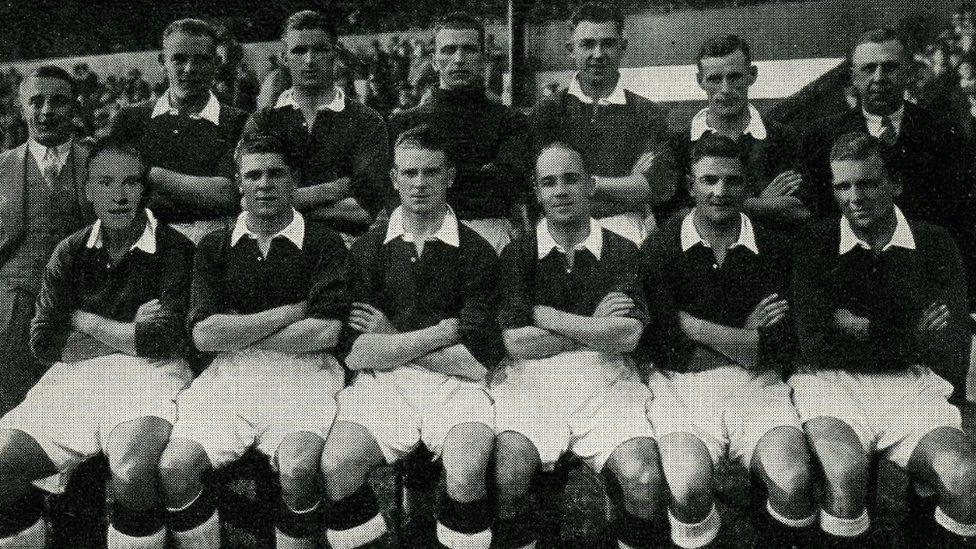
George Camsell (front row, third from left) was Middlesbrough's top goal scorer 10 years in a row
And Mr Menzies said one of the Riverside statue subjects, Wilf Mannion, would have wanted to see Camsell equally revered.
"I spoke to Wilf about George Camsell and Wilf always talked about him in absolute awe, almost as if he were talking about a God-like figure."
A suite at the Riverside is named after Camsell and a club spokesman said a statue of him could never be ruled out.
"As a club we honour and respect our former heroes and George Camsell is certainly one of those," the spokesman said.
But more needs to be done, according to George Camsell Junior.
"He was an amazing footballer," he said.
"He got his chance in Middlesbrough's first team after the centre forward was injured.
"He came into the team after four games of the season and never looked back from there."
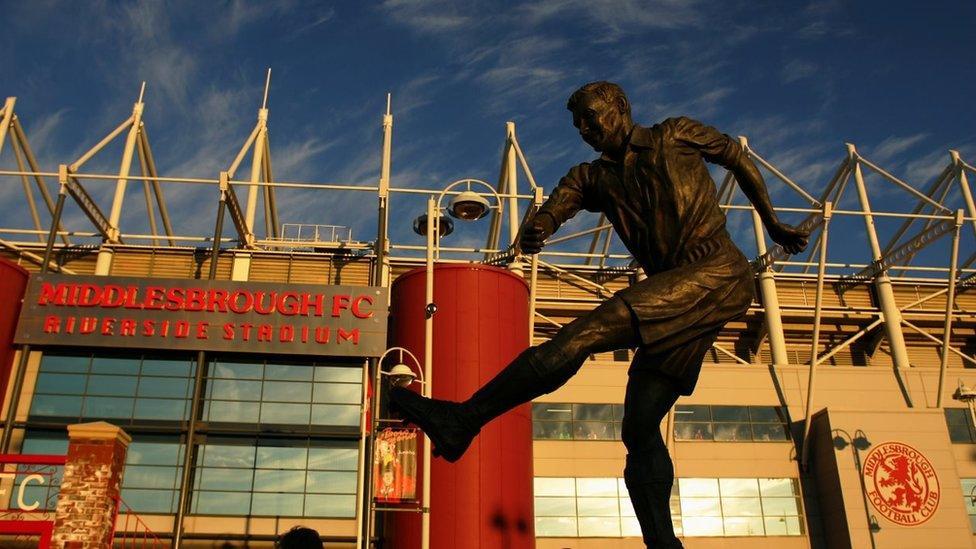
A Middlesbrough spokesman said a statue of George Camsell going up alongside tributes to Wilf Mannion and George Hardwick could not be ruled out
And his goalscoring might have been even better had he taken penalties.
"He took one or two penalties at the beginning but he missed one," said Mr Camsell.
"After that he said he wouldn't take any more.
"He knew where the goal was and went for it, not like today when they play across the pitch.
"He went from north to south not east to west.
"After the football he took up bowls, he won a load of trophies for that, and he was also good at tennis and snooker, he was a talented all-rounder."

Wayne Rooney is England's all-time top goalscorer
So how would Camsell compare against today's footballers?
It's impossible to say, said Dr Jackson.
A change in the rules shortly before he joined Boro made it harder for players to be caught offside, allowing strikers to net more goals than previously.
But defenders were tougher then too and stronger challenges abounded, so forwards had to cope with a much more physical game than they do today.
"He was a phenomenal footballer," Dr Jackson said.
"His achievements deserve to be recognised."
- Published25 May 2015

- Attribution
- Published8 September 2015
- Attribution
- Published8 September 2015
